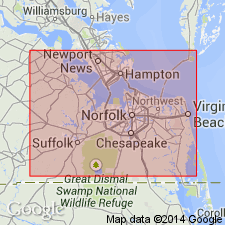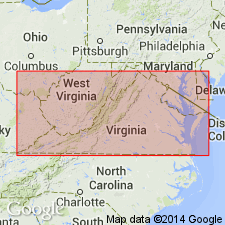
- Usage in publication:
-
- Kempsville Formation
- Modifications:
-
- Named
- Dominant lithology:
-
- Sand
- Gravel
- Clay
- AAPG geologic province:
-
- Atlantic Coast basin
Summary:
Kempsville Formation named in this report in Princess Anne Co., southeastern VA. Unit consists of beach sand, gravel, clay, and shells. Maximum thickness is 15 ft. Overlies Diamond Springs Formation (new) and underlies Londonbridge Formation (new). Late Pleistocene age based on radiocarbon age of about 40,000 yrs.
Source: GNU records (USGS DDS-6; Reston GNULEX).

- Usage in publication:
-
- Kempsville Member
- Modifications:
-
- Revised
- AAPG geologic province:
-
- Atlantic Coast basin
Summary:
Kempsville (top), Norfolk, and Great Bridge Formations reduced to Member rank and assigned to Acredale Formation, here named in the Virginia Beach area. Units represent single transgressive-regressive event, laterally and vertically intergrading lithofacies and biofacies of estuarine silty sands, continental shelf sands, and beach to fluvial sands. Age modified to late Pleistocene.
Source: GNU records (USGS DDS-6; Reston GNULEX).
For more information, please contact Nancy Stamm, Geologic Names Committee Secretary.
Asterisk (*) indicates published by U.S. Geological Survey authors.
"No current usage" (†) implies that a name has been abandoned or has fallen into disuse. Former usage and, if known, replacement name given in parentheses ( ).
Slash (/) indicates name conflicts with nomenclatural guidelines (CSN, 1933; ACSN, 1961, 1970; NACSN, 1983, 2005, 2021). May be explained within brackets ([ ]).

